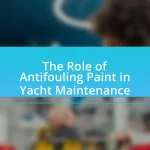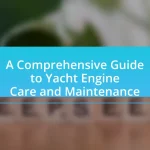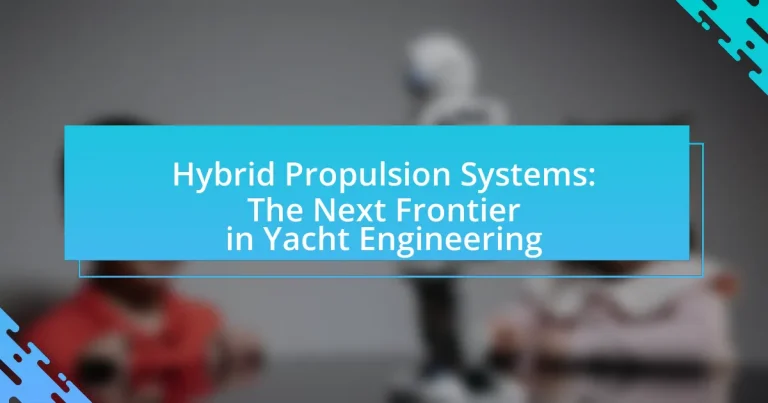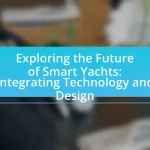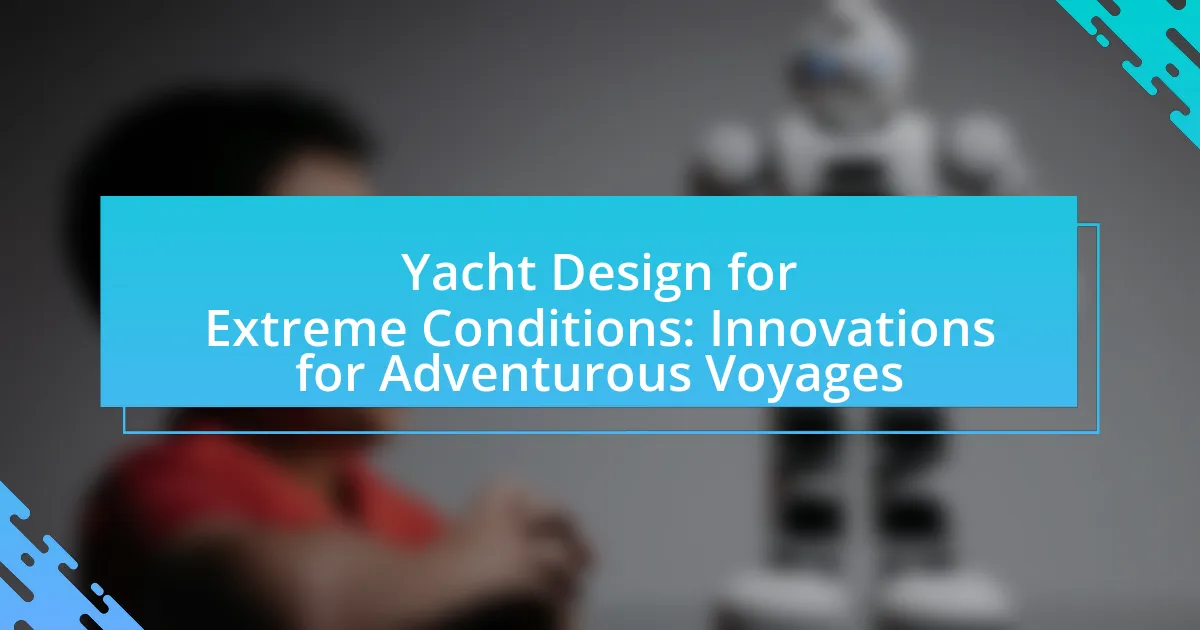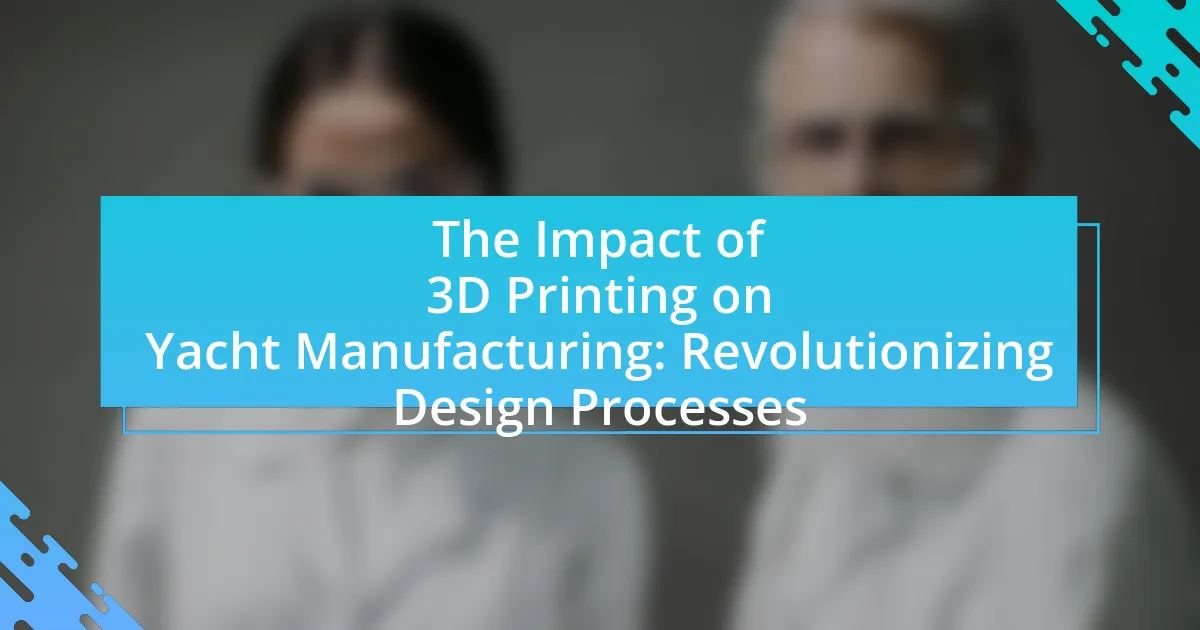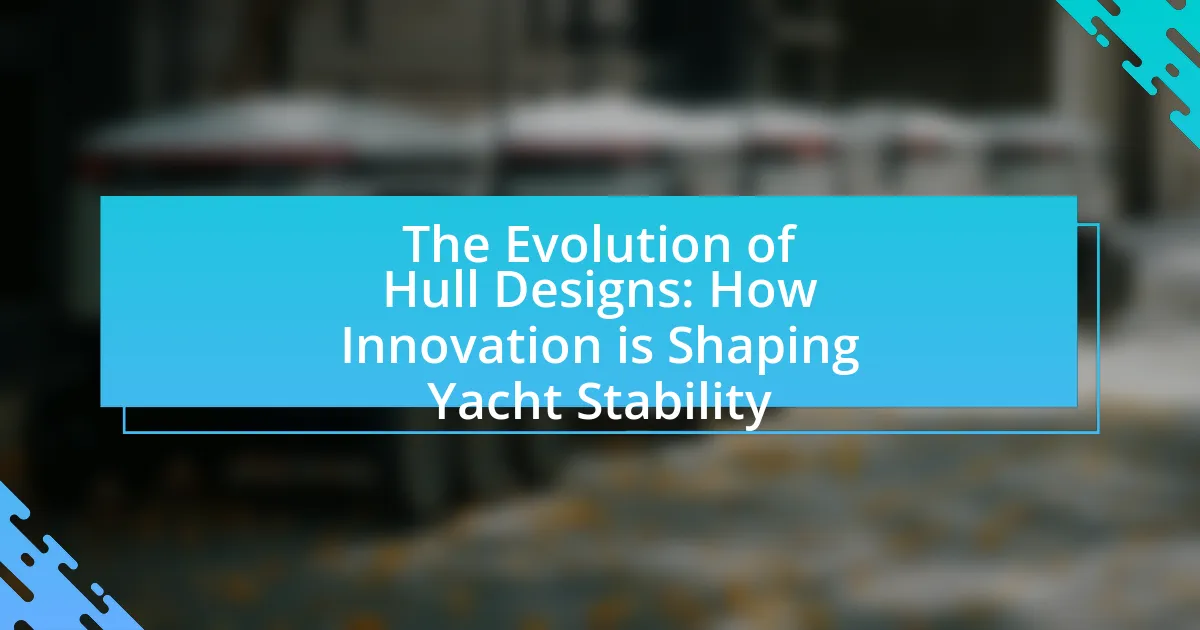Hybrid propulsion systems represent a significant advancement in yacht engineering, integrating traditional internal combustion engines with electric propulsion technologies to enhance fuel efficiency and reduce emissions. These systems allow yachts to operate on electric power for short distances, minimizing environmental impact, while utilizing diesel engines for longer voyages. Key components include internal combustion engines, electric motors, battery storage systems, and power management systems, all working together to optimize performance. The article also addresses the advantages of hybrid systems, such as improved fuel efficiency and compliance with environmental regulations, as well as the challenges and innovations driving their adoption in the maritime industry.
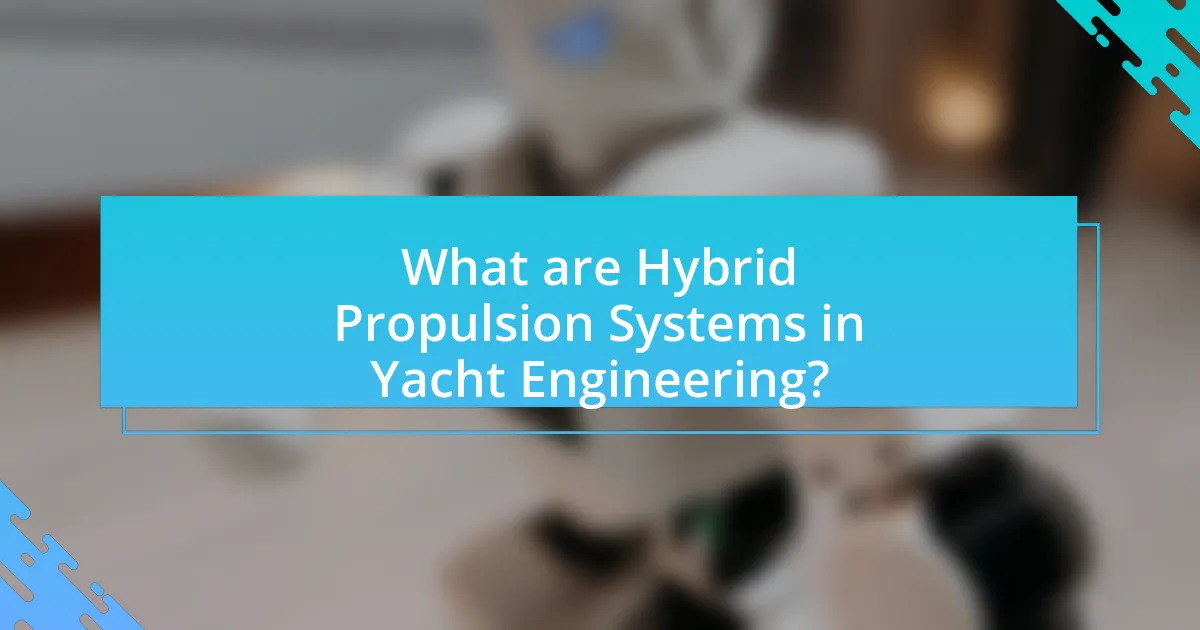
What are Hybrid Propulsion Systems in Yacht Engineering?
Hybrid propulsion systems in yacht engineering are integrated systems that combine traditional internal combustion engines with electric propulsion technologies. These systems enhance fuel efficiency, reduce emissions, and provide greater operational flexibility. For instance, a yacht equipped with a hybrid propulsion system can operate on electric power for short distances, minimizing environmental impact, while relying on diesel engines for longer voyages, thus optimizing performance and sustainability. The adoption of hybrid systems in the maritime industry is supported by regulations aimed at reducing greenhouse gas emissions, such as the International Maritime Organization’s initiatives, which encourage the development of cleaner technologies in marine transportation.
How do Hybrid Propulsion Systems differ from traditional propulsion systems?
Hybrid propulsion systems combine conventional internal combustion engines with electric propulsion, differing from traditional propulsion systems that rely solely on internal combustion engines. This integration allows hybrid systems to optimize fuel efficiency and reduce emissions by utilizing electric power during low-speed operations or when additional power is not required. For instance, hybrid systems can operate silently and with zero emissions in sensitive marine environments, which is a significant advantage over traditional systems that produce continuous noise and emissions. Additionally, hybrid systems can enhance performance by providing instant torque from electric motors, improving acceleration and maneuverability compared to the gradual power delivery of traditional engines.
What are the key components of Hybrid Propulsion Systems?
The key components of Hybrid Propulsion Systems include an internal combustion engine, an electric motor, a battery storage system, and a power management system. The internal combustion engine provides traditional propulsion, while the electric motor allows for silent operation and reduced emissions. The battery storage system stores energy for the electric motor and can be recharged through the engine or external sources. The power management system optimizes the use of these components, ensuring efficient energy distribution and performance. These components work together to enhance fuel efficiency and reduce environmental impact in yacht engineering.
How do these components work together in a yacht?
Hybrid propulsion systems in yachts integrate multiple components, including internal combustion engines, electric motors, batteries, and control systems, to optimize performance and efficiency. The internal combustion engine provides primary power, while the electric motor can operate independently or in conjunction with the engine, allowing for silent operation and reduced fuel consumption. Batteries store energy generated from the engine or through regenerative processes, supplying power to the electric motor when needed. Control systems manage the interaction between these components, ensuring seamless transitions and optimal energy use. This synergy enhances fuel efficiency, reduces emissions, and improves overall performance, making hybrid systems a significant advancement in yacht engineering.
What advantages do Hybrid Propulsion Systems offer for yachts?
Hybrid propulsion systems offer yachts enhanced fuel efficiency and reduced emissions. By combining traditional engines with electric propulsion, these systems allow for quieter operation and lower environmental impact, which is increasingly important in marine regulations. For instance, studies show that hybrid systems can reduce fuel consumption by up to 30%, significantly lowering operational costs. Additionally, the ability to operate on electric power alone in certain conditions minimizes noise pollution, benefiting marine wildlife and improving the onboard experience for passengers.
How do Hybrid Propulsion Systems improve fuel efficiency?
Hybrid propulsion systems improve fuel efficiency by combining traditional internal combustion engines with electric propulsion. This integration allows for optimized power management, enabling vessels to operate on electric power at lower speeds or during idle periods, significantly reducing fuel consumption. According to a study by the International Maritime Organization, hybrid systems can achieve fuel savings of up to 30% compared to conventional propulsion systems, particularly in applications where variable speed and load conditions are prevalent. This efficiency is further enhanced by regenerative braking, which captures energy during deceleration and reuses it, further lowering overall fuel usage.
What environmental benefits are associated with Hybrid Propulsion Systems?
Hybrid propulsion systems significantly reduce greenhouse gas emissions compared to traditional propulsion methods. By combining conventional engines with electric power sources, these systems can operate more efficiently, leading to lower fuel consumption and reduced carbon dioxide output. For instance, studies indicate that hybrid systems can decrease emissions by up to 30% in marine applications. Additionally, hybrid propulsion minimizes noise pollution and enhances energy efficiency, contributing to a healthier marine ecosystem. This dual approach not only supports regulatory compliance with environmental standards but also promotes sustainable practices in yacht engineering.
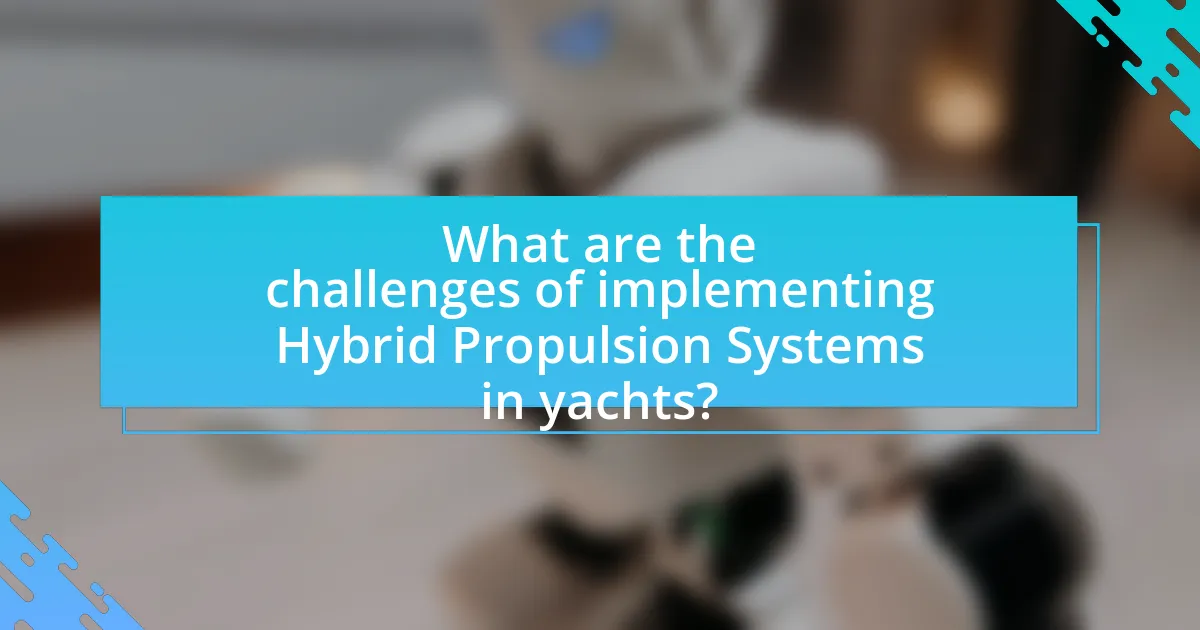
What are the challenges of implementing Hybrid Propulsion Systems in yachts?
The challenges of implementing Hybrid Propulsion Systems in yachts include high initial costs, complexity of integration, and regulatory compliance. High initial costs arise from the advanced technology and components required for hybrid systems, which can deter potential buyers. The complexity of integration involves ensuring that the hybrid system works seamlessly with existing yacht designs and systems, often requiring specialized knowledge and skills. Regulatory compliance presents challenges as different regions have varying environmental regulations that hybrid systems must meet, complicating the design and operational processes. These factors collectively hinder the widespread adoption of hybrid propulsion in the yacht industry.
What technical obstacles must be overcome?
Hybrid propulsion systems in yacht engineering face several technical obstacles that must be overcome for successful implementation. Key challenges include the integration of electric and traditional propulsion systems, which requires advanced control algorithms to ensure seamless operation and efficiency. Additionally, battery technology must improve to provide sufficient energy density and reduce weight, as current batteries often do not meet the power demands of larger yachts. Furthermore, the development of reliable and efficient energy management systems is crucial to optimize fuel consumption and emissions. These obstacles are supported by industry reports indicating that advancements in battery technology and control systems are essential for the widespread adoption of hybrid systems in marine applications.
How does the integration of Hybrid systems affect yacht design?
The integration of hybrid systems significantly enhances yacht design by allowing for greater energy efficiency and reduced emissions. Hybrid propulsion systems combine traditional engines with electric motors, enabling yachts to operate in a more environmentally friendly manner while optimizing fuel consumption. This shift in design not only improves performance but also meets increasing regulatory demands for sustainability in marine environments. For instance, according to a study by the International Maritime Organization, hybrid systems can reduce greenhouse gas emissions by up to 30%, demonstrating their effectiveness in promoting eco-friendly yacht engineering.
What are the maintenance considerations for Hybrid Propulsion Systems?
Maintenance considerations for Hybrid Propulsion Systems include regular inspections of both the electric and internal combustion components, ensuring battery health and performance, and monitoring the integration of systems for optimal efficiency. These systems require specialized knowledge for maintenance due to their complexity, necessitating trained personnel familiar with both electrical and mechanical systems. Additionally, routine software updates and diagnostics are essential to maintain system performance and safety. Regular maintenance schedules should also account for the unique wear patterns associated with hybrid systems, which can differ from traditional propulsion systems.
How do regulations impact the adoption of Hybrid Propulsion Systems?
Regulations significantly influence the adoption of Hybrid Propulsion Systems by establishing standards that manufacturers must meet for safety, emissions, and efficiency. For instance, the International Maritime Organization (IMO) has set stringent emissions regulations, such as the International Convention for the Prevention of Pollution from Ships (MARPOL), which encourages the development and implementation of cleaner technologies like hybrid systems. Compliance with these regulations often drives innovation and investment in hybrid technologies, as companies seek to meet or exceed regulatory requirements while also appealing to environmentally conscious consumers.
What are the current regulations governing Hybrid Propulsion Systems in yachting?
Current regulations governing Hybrid Propulsion Systems in yachting primarily stem from the International Maritime Organization (IMO) and regional maritime authorities, which emphasize emissions reduction and energy efficiency. The IMO’s MARPOL Annex VI sets limits on greenhouse gas emissions from ships, influencing the design and operation of hybrid systems to comply with these standards. Additionally, the European Union’s regulations, such as the EU’s Energy Efficiency Directive, further mandate energy efficiency measures for vessels, including those utilizing hybrid propulsion. Compliance with these regulations is essential for yacht manufacturers and operators to ensure environmental sustainability and adherence to international maritime laws.
How might future regulations shape the development of these systems?
Future regulations will significantly influence the development of hybrid propulsion systems in yacht engineering by establishing standards for emissions, safety, and efficiency. These regulations may mandate lower emissions thresholds, pushing manufacturers to innovate cleaner technologies and improve energy efficiency. For instance, the International Maritime Organization’s (IMO) 2020 regulations on sulfur emissions have already prompted the maritime industry to explore hybrid solutions to comply with stricter environmental standards. Additionally, regulations may require enhanced safety protocols, leading to the integration of advanced monitoring systems and fail-safes in hybrid designs. Overall, regulatory frameworks will drive technological advancements and shape market dynamics in the hybrid propulsion sector.
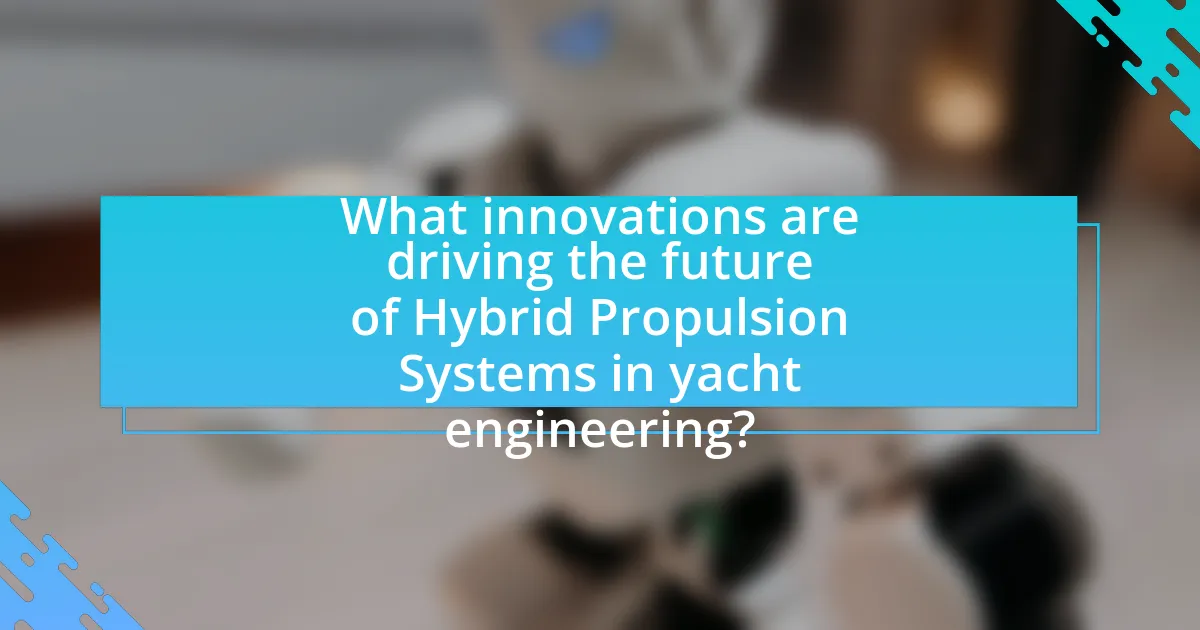
What innovations are driving the future of Hybrid Propulsion Systems in yacht engineering?
Innovations driving the future of Hybrid Propulsion Systems in yacht engineering include advancements in battery technology, integration of renewable energy sources, and enhanced energy management systems. Battery technology improvements, such as lithium-ion and solid-state batteries, provide higher energy density and faster charging times, enabling longer operational ranges. The integration of renewable energy sources, like solar panels and wind turbines, allows yachts to harness natural energy, reducing reliance on traditional fuel. Enhanced energy management systems optimize the use of power from various sources, improving efficiency and performance. These innovations collectively contribute to more sustainable and efficient yacht operations, aligning with industry trends towards eco-friendliness and reduced emissions.
What role does technology play in advancing Hybrid Propulsion Systems?
Technology plays a crucial role in advancing Hybrid Propulsion Systems by enhancing efficiency, reducing emissions, and improving overall performance. Innovations such as advanced battery technologies, energy management systems, and hybrid control algorithms enable vessels to optimize fuel consumption and minimize environmental impact. For instance, the integration of lithium-ion batteries allows for longer operational ranges and quicker charging times, while sophisticated energy management systems can dynamically adjust power distribution between the internal combustion engine and electric motors. These technological advancements are supported by industry research, such as the 2021 study by the International Maritime Organization, which highlights the potential for hybrid systems to reduce greenhouse gas emissions by up to 30% compared to traditional propulsion methods.
How are battery technologies evolving for marine applications?
Battery technologies for marine applications are evolving through advancements in energy density, charging speed, and sustainability. Recent developments include the use of lithium-sulfur and solid-state batteries, which offer higher energy densities compared to traditional lithium-ion batteries, enabling longer voyages without increasing weight. Additionally, rapid charging technologies are being integrated, allowing for quicker turnaround times in port. Furthermore, manufacturers are focusing on environmentally friendly materials and recycling processes to reduce the ecological impact of battery production and disposal. For instance, the International Maritime Organization has set targets for reducing greenhouse gas emissions, prompting the marine industry to adopt cleaner battery technologies.
What advancements in energy management systems are being made?
Advancements in energy management systems include the integration of artificial intelligence for predictive analytics, enabling real-time optimization of energy consumption. These systems utilize machine learning algorithms to analyze historical data and forecast energy needs, which enhances efficiency and reduces waste. For instance, a study by the International Energy Agency in 2022 highlighted that AI-driven energy management systems can improve energy efficiency by up to 30% in industrial applications. Additionally, advancements in IoT technology allow for better connectivity and monitoring of energy usage across various devices, facilitating more informed decision-making and energy conservation strategies.
What are the trends in consumer preferences regarding Hybrid Propulsion Systems?
Consumer preferences regarding Hybrid Propulsion Systems are increasingly leaning towards sustainability, efficiency, and advanced technology. A significant trend is the growing demand for eco-friendly solutions, as consumers prioritize reducing their carbon footprint; for instance, a survey by the International Council on Clean Transportation found that 70% of consumers are willing to pay more for environmentally friendly options. Additionally, consumers are favoring systems that offer improved fuel efficiency and lower operational costs, reflecting a shift towards long-term economic benefits. The integration of smart technology in hybrid systems, such as real-time monitoring and automated performance optimization, is also gaining traction, as it enhances user experience and operational efficiency.
How are yacht owners’ attitudes changing towards sustainability?
Yacht owners’ attitudes towards sustainability are increasingly positive, with a growing emphasis on eco-friendly practices and technologies. This shift is driven by heightened awareness of environmental issues and the desire to reduce carbon footprints. For instance, a survey conducted by the International Council on Clean Transportation in 2022 revealed that 65% of yacht owners are now prioritizing sustainable options, such as hybrid propulsion systems, which significantly lower emissions compared to traditional engines. This trend indicates a clear movement towards integrating sustainability into yacht ownership and operation.
What features are most desired in modern Hybrid yachts?
The most desired features in modern hybrid yachts include energy efficiency, reduced emissions, and advanced technology integration. Energy efficiency is achieved through hybrid propulsion systems that combine traditional engines with electric motors, allowing for lower fuel consumption and longer range. Reduced emissions are a critical concern, as hybrid yachts significantly lower carbon footprints compared to conventional yachts, aligning with global sustainability goals. Advanced technology integration, such as smart navigation systems and automated energy management, enhances user experience and operational efficiency. These features are increasingly sought after as the yachting industry moves towards more environmentally friendly and technologically advanced solutions.
What practical tips should yacht owners consider when choosing Hybrid Propulsion Systems?
Yacht owners should prioritize efficiency, compatibility, and maintenance when choosing Hybrid Propulsion Systems. Efficiency is crucial; selecting a system that optimizes fuel consumption and reduces emissions can lead to significant cost savings and environmental benefits. Compatibility with the yacht’s existing systems is essential to ensure seamless integration and performance. Additionally, considering the maintenance requirements of the hybrid system is vital, as some systems may demand more frequent servicing or specialized knowledge. Research indicates that hybrid systems can reduce fuel consumption by up to 30%, making them a financially and environmentally sound choice for yacht owners.

